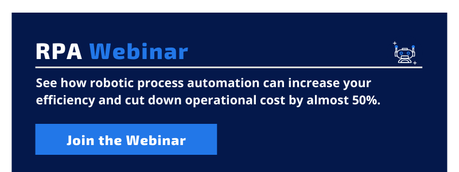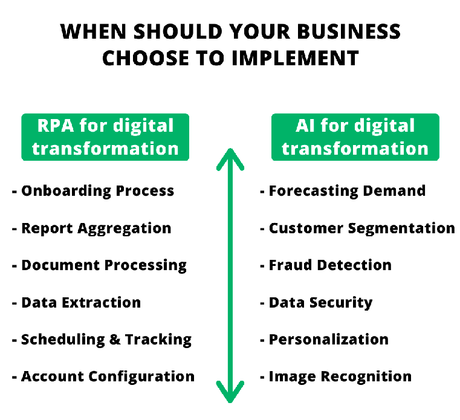RPA and AI are now one of the most talked-about technologies. They drive growth in the enterprises by reducing costs, minimizing human dependencies, and increasing the efficiency of organizations.
Robotic Process Automation(RPA) involves bots that mimic human actions. But is that the same as AI? No. Artificial Intelligence(AI) relates to algorithms that imitate human behaviour. The difference lies in the actions and behaviour part, which makes RPA more of an action-oriented technology and AI a decision-oriented technology.
But when you embark on your digital transformation journey, you may face the following question -
"Should you consider RPA implementation or Artificial Intelligence(AI) systems?"
Let's have a closer look at what separate RPA and AI and how both can help you in achieving digital transformation for your enterprise.
Robotic Process Automation(RPA): The Role in your Enterprise
Robotic Process Automation(RPA) involves the use of software bots to automate repetitive, mundane, and routine business processes. From data entry in excel sheets to logging in, RPA software can help enterprises to automate every task that requires performing the same action every single time.
The most significant difference between Automation and Artificial Intelligence is that RPA supports digital transformation like AI, but doesn't learn from the repetitions.
RPA bots continuously perform one task, and unlike Artificial Intelligence(AI), which learns by itself from the environment, Robotic Process Automation(RPA) is restricted to completing predetermined tasks.
RPA software is used to build rule-based bots that are programmed to do a particular task. For example, if you program an RPA bot to extract data from pdf files based on a simple rule, it will keep on doing that task until a specific parameter to stop is entered.
But how do you determine which processes to automate in your organization? This article gives you the three primary steps through which you can perfectly identify the processes that need automation.
How RPA Supports Digital Transformation
The role of RPA in supporting digital transformation entails delegating the mundane tasks to software bots and providing more time to employees for productive and decision making tasks. These RPA software bots will not come up with a better way of doing things - they will keep on doing them until commanded to stop.
Here are the clear reasons why digital transformation and RPA go hand-in-hand:
1. Consistency in result delivery
If you are looking to achieve consistent results in some specific tasks, Robotic Process Automation(RPA) is the way to go. RPA software likeAutomation Anywhere, UiPath, BluePrism, etc., allow building bots that can perform specific actions.
The major benefit is that it increases the accuracy in performing repetitive operations. How? Humans can make errors due to tiredness, distractions, and whatnot. On the other hand, your digital enterprise will be able to generate 100% accurate results as the machines do not make any errors that humans do.
Robotic Process Automation(RPA) is known for its accurate results, and financial & utility companies utilize them for accurate data entry.2. An efficient enterprise machine
While your enterprise is always on the lookout to make the processes efficient, RPA implementation results in phenomenal speed in the completion of tasks.
Automation drives digital transformation by multiplying the pace 4 to 5 times at which your employees currently complete the tasks.
Employees need to type hefty information, take breaks in between, and can work up to a certain level of capacity. They get tired and cannot work 24×7.
Robotic Process Automation is the medication to all such problems. It can work 24×7 because the bots never get tired. They can enter hefty chunks of information and extract data without ever getting tired.
A significant difference between Automation and AI involves the fact that while AI programs may take a while to process the information, RPA can quickly complete all the tasks because it doesn't process any data. It just does what it's been programmed for.
3. Cost-cutting is the new normal
Your primary purpose of focusing on digital transformation is to reduce costs while building a digital enterprise. Well, you're in luck because Robotic Process Automation is one of the best ways to cut down your operational costs.
Imagine how much cost you could save if you replaced all your back office employees who simply entered data with RPA software bots? You would need only a few to supervise the Robotic Process Automation(RPA) bots.
This does not entail that you lay off these employees. On the contrary, now that the back office employees won't have any work in that area, they would have to upskill. It means that they will learn technologies like web development, marketing, AI, ML, project management, and everything that could help keep their job.
What it offers is one of the biggest bonuses that you could give to your enterprise, which is ,
Productivity Boost: The biggest bonus from Robotic Process AutomationSo we have arrived at the fact that RPA implementation gives you a productivity boost that no other technology can. How does it do that?
- RPA bots complete mundane tasks so your team can focus on other essential tasks
- When team members feel they are contributing to important tasks, their sense of belonging and meaningfulness in the job multiplies drastically
- It keeps them satisfied and engaged, leading to a productivity boost that your enterprise has never seen before
- It also entails that now your employees will come up with creative ideas and promote a culture of innovation in the organization.
- RPA software bots are, thus, the most productive drivers of digital transformation and employee satisfaction.
When should you implement Robotic Process Automation for maximum results? Read the answer here.
However, there's no need to believe that human resources are out of the picture with RPA implementation. Robotic Process Automation is feasible for your enterprises if it works in tandem with employees. As a standalone technology, RPA still has a long way to go, which is far away in the future.
You can TALK for FREE with one of our RPA experts and get started with your digital transformation journey today.
Artificial Intelligence(AI): The role in your Enterprise
Artificial intelligence involves technologies that can mimic human behaviour. AI systems can simulate intellectual capabilities and act as humans do.
The best example of a world-class AI machine(although a fictional one) which explains everything you want to know about Artificial Intelligence is Tony Stark's AI bot, Jarvis.
Unlike RPA, AI is a self-learning technology that learns from the data fed to it and makes decisions. RPA was a static technology that used rules while AI is more of a dynamic, on-the-move technology that is continuously adapting from its environment.
So why is everyone selling Artificial Intelligence to you? Because it works in ways you can't fathom. Artificial Intelligence(AI) helps you to,
- Predict future demand for products
- Calculate near-perfect ROI on your expenditure
- Set the perfect marketing budget
- Identify the best prospects for an interview
- Detect frauds in your financial statements, and countless other things.
While Artificial Intelligence looks like the most interesting digital transformation technology, it is not. The real hard-worker behind Artificial Intelligence is Machine Learning.
Artificial Intelligence(AI), Machine Learning(ML), and their Role in Digital Transformation
Machine Learning is an approach to implementing Artificial Intelligence(AI). It involves algorithms and models that learn from data, train themselves, and make predictions. Machine Learning is the backend technology that makes Artificial Intelligence possible.
The biggest advantage of Machine Learning for AI implementation is that it uses historical data to learn. Because of Machine Learning, RPA AI systems are able to make use of big data and cloud computing for processing massive amounts of data.
Here are three best use cases of Artificial Intelligence in action for enterprise-wide digital transformation:-1. Predictive analytics and maintenance
One of the biggest contributors to digital transformation is predicting the future based on your history. It means analyzing historical data to make predictions that conform to that pattern. For this, supervised learning is used, which parses massive amounts of data and delivers output based on the predetermined inputs.
General Electric is a prime example of a company using Artificial Intelligence(AI) for predictive maintenance. Their AI platform PREDIX allows the company to utilize the historical performance of their equipment to figure out when it needs maintenance. It saves them from huge costs that might occur from a sudden machine breakdown.
2. Segment your customers
Another significant benefit of AI machines and their implementation is that it allows you to easily segment your customers. By feeding in the demographics, age, gender, behaviour, and other parameters, Machine Learning algorithms can segment customers without any hassle.
It is necessary to target the audience for particular products. If you go a level deeper, Machine Learning combined with Deep Learning can recognize images, speech, and text of prospective customers to create the exact buyer persona for your company.
3. Minimize fraud, spam, and security threats
Digital transformation depends on the accuracy of your transactions and how efficiently you are able to achieve the desired results. It means utilizing Machine Learning for detecting fraudulent transactions and SPAM emails that reduce the productivity of your organization.
Systematic AI implementation helps in minimizing fraud by feeding parameters to the Machine Learning models, which can easily detect the anomalies in any system. It keeps your digital.
RPA and AI: The Automation Intelligence model of Digital Transformation
Now that you have read about the difference between Automation and Artificial Intelligence, it is time to explore a topic which can make your enterprise a powerhouse of digital transformation.
Yes- We are talking about combining Artificial Intelligence(AI) and Robotic Process Automation(RPA) to support digital transformation.
For example, AI can make predictions based on the data, but what if RPA could automatically extract data for these models from different accounts? That would save you a lot of time. It is just a simple example, but valuable nonetheless.
The multiple RPA AI use cases mentioned above will multiply in their efficiency when both the technologies are used together. Creating a strategy that allows RPA and AI to work in tandem is the best path for digital transformation.
The right strategy for digital transformation involves utilizing Artificial Intelligence(AI) in the initial stages to structure the unstructured data, then focusing on RPA implementation to extract data and information, and finally using AI to make intelligent, informative, and insightful decisions.
RPA and AI implementation will provide end-to-end automation without any human intervention at all. Both the technologies empower each other and make sure that customers get the most satisfaction out of their transactions with the enterprise.
Here is an excellent example of how RPA and AI can work to provide end-to-end automation in opening bank accounts or equally, create a customer account.
Which is Better RPA or AI? Which technology should you choose for digital transformation?

The answer is that it depends on which stage of digital transformation is your enterprise focusing on. If you want efficiency in the operational process, RPA can be a good choice. On the other hand, Artificial Intelligence(AI) is the perfect technology if you want intelligent machines to derive valuable insights.
The best strategy to implement both the technologies in moderation such that each one complements the other. RPA and AI can provide your capabilities for increasing efficiency, boosting productivity, and building an organization with maximum profitability and ROI on digital transformation.
Don't Wait! Click here and TALK FOR FREE with one of our digital transformation experts who can help you with AI, ML, and RPA implementation.Total Page Visits: 707 - Today Page Visits: 20


